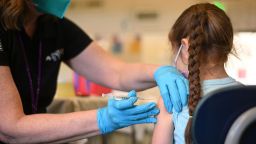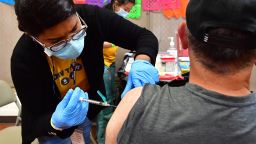Editor’s Note: Dr. Julie Morita (@DrJulieMorita), a pediatrician, is executive vice president of the Robert Wood Johnson Foundation and member of the US Centers for Disease Control and Prevention’s Advisory Committee to the Director. She served in a personal capacity on the Biden-Harris Covid-19 Transition Advisory Board and is a former member of the CDC’s Advisory Committee on Immunization Practices. The opinions expressed in this commentary are those of the author. Read more opinion on CNN.
Covid-19 vaccinations for children remain one of the most significant pieces of unfinished business in our pandemic response.
Since vaccines were authorized for children ages 5-11 seven months ago, less than 30% have completed their primary two-dose series, according to data from the US Centers for Disease Control and Prevention; for children ages 12-17, who have been eligible for more than a year, less than 60% have had two doses. With more than 400,000 Covid-19 cases among children reported during the past four weeks through June 2, too many children remain vulnerable. We have the tools to meet this challenge, if only we’re willing to use them.
Pfizer recently announced that it had submitted to the US Food and Drug Administration a request for emergency use authorization for Covid-19 vaccines for kids ages 6 months to 5 years of age. On June 15, the FDA’s Vaccines and Related Biological Products Advisory Committee (VRBPAC) will meet to discuss the request. (Moderna also submitted to the FDA vaccine data for children in the same age group in late April.)
If the committee endorses moving ahead and the FDA ultimately does so, the CDC’s Advisory Committee on Immunization Practices would then follow with recommendations for use. Those recommendations would be presented to the CDC director, Dr. Rochelle Walensky, who makes the final call.
As we approach that pivotal June 15 meeting, it is worth examining our prior vaccination efforts to identify the steps and mindset shifts necessary to do better. As a pediatrician who has personally vaccinated hundreds of children and as a former health department commissioner who oversaw many large-scale vaccination programs, I have five principles that must guide the next phase of the US Covid response.
The pandemic is not over
The United States is averaging almost 100,000 new cases per day, along with 3,800 daily hospitalizations, according to the CDC. More than 55% of the population lives in counties experiencing high or medium levels of community spread, and the Biden administration warns that we face a possible 100 million new cases this fall and winter. The continued large gaps in our vaccination rates – children ages 5-11 have the lowest vaccination rate of any eligible age group –make it easier for the virus to adapt, infect and re-infect. Congress must approve the additional funding needed to ensure we have enough vaccines for all eligible populations, along with needed testing and treatments.
Lower risk does not mean no risk
As any parent will attest, a saving grace of this pandemic is that children have generally been at lower risk of severe disease. But we must finally put to rest the canard that children have nothing to fear from Covid-19, a misguided notion that has undoubtedly contributed to low vaccination rates.
The Children’s Hospital Association and the American Academy of Pediatrics reported that more than 13 million children have been infected over the course of the pandemic. Meanwhile, CDC data shows us that more than 8,000 have developed a related, severe inflammatory condition known as MIS-C, more than 1,200 have died, and last winter’s spike in youth hospitalizations was driven by children who were too young to be vaccinated and older children who could have been vaccinated but were not. More than 5 million of the 13 million total infections have occurred in 2022 alone, according to the American Academy of Pediatrics.
Do not let the perfect be the enemy of the good
As the virus has adapted, our current vaccines have become less effective at preventing Omicron-related infections, including among kids. However, Covid-19 vaccines prevent the worst outcomes: Researchers estimate that these vaccines saved more than 1 million lives in the United States during their first year. They continue to provide children with strong protection against hospitalization and death, with adverse reactions exceedingly rare.
While we don’t yet have the full analysis on efficacy and safety data for vaccines for our youngest children, early results are promising, according to Pfizer and Moderna. If the FDA’s and CDC’s independent advisory groups determine that children under 5 should receive vaccination protection, we should follow their recommendations.
No one should have to choose between vaccinating children and receiving a paycheck
Any successful vaccination campaign must pair a strong supply with easy access, yet parents of children ages 5-11 report significant barriers: Thirty-five percent are concerned about taking time off work to get children vaccinated or staying home with them afterward, 25% are concerned about vaccines not being available in a trusted place and 19% are concerned about traveling to a clinic, according to the Kaiser Family Foundation (KFF).
Parents not being able to take time off is a costly hindrance to kids’ vaccine access, but the United States continues to remain alone among wealthy nations in offering no national paid leave program. Only 10 states have their own, and only 14 require employers to include care for a child in paid sick programs. Many workers in low-paying jobs do not receive a single paid sick day. Expanding paid sick and family medical leave must be a national priority.
Parents are seeking vaccination information from trusted sources
More than twice as many parents of children under 5 plan to “wait and see” (38%) versus getting their children vaccinated right away (18%), according to KFF polling released in early May. This mirrors trends seen among parents of older children. That is understandable. Unfortunately, misinformation is easy to find: KFF polling shows that nearly 80% of adults have heard at least one myth about Covid-19 vaccines – such as that they cause death or lead to infertility – and either say it is true or are unsure if it is false.
Get our free weekly newsletter
Doctors, pediatricians and local health departments are among the most trusted sources for accurate vaccine information. They should address questions and concerns with empathy and thoughtfulness. And, if parents ultimately decide to vaccinate their children, the steps necessary to maintain a sustained and equitable rollout – such as bringing vaccines directly to underserved schools and communities, ensuring appointments after hours and on weekends, and permitting walk-in visits for those who cannot make appointments – should continue to be prioritized.
Children ultimately depend on adults for any vaccination protection they receive. For older children already eligible for primary vaccination and boosters, parents should prioritize vaccination now. And, if safe and effective Covid-19 vaccines are authorized for our youngest children, I hope that parents will prioritize this protection for them and that our policies make it possible for them to do so. By following these principles, every family can make the right call about Covid-19 vaccines.





